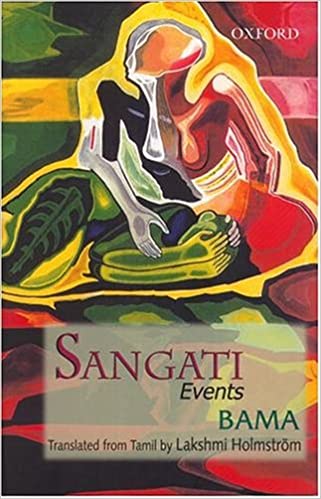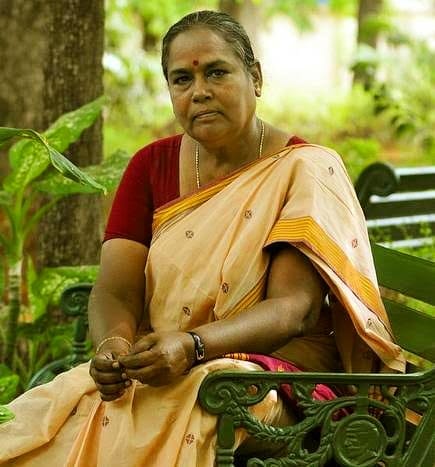

The story of 'Sangati', the searing feminist novel dropped by DU
Born in V Puduppatti in Virudhunagar district to a Dalit Roman Catholic family, Bama worked as a school teacher for many years before becoming a full-time writer. Her first work was 'Karukku', an autobiographical work published in 1992. The second novel 'Sangati' too contains autobiographical elements and is set in Virudhunagar.

Delhi University’s decision to remove the works two Tamil Dalit women authors, Bama and Sukirtharani, from their English syllabus has caused a lot of heartburn and anger in various quarters.
The works of these women authors were part of the fifth semester syllabus in the undergraduate English Honours course. The novel, which has been dropped is ‘Sangati’ written by Tamil Dalit feminist and author, Bama Faustina Soosairaj. It was Bama’s second work published in 1994 and later translated into English as ‘Events’ in 2001 by Lakshmi Holmstrom.

Born in V Puduppatti in Virudhunagar district to a Dalit Roman Catholic family, Bama worked as a school teacher for many years before becoming a full-time writer. Her first work was ‘Karukku’, an autobiographical work published in 1992.
Cesspool of caste
The second novel ‘Sangati’ too contains autobiographical elements and is set in Virudhunagar. Narrated in a first person account, the novel starts with the birth of Fatima who is the third child in her family. In the novel, Fatima says, ‘If the third is a girl to behold, your courtyard will fill with gold’. When I was born, it seems that my grandmother, Vellaiyamma quoted this proverb and rejoiced.
Doted on by her grandmother Vellaiamma, the novel centres around the exchanges between Vellaiamma and Fatima based on the daily events unfolding in their village.
The exchanges are mostly on how Dalit women continue to be subjugated by the men within the community and by society as a whole outside the community. It is just as Dr Ambedkar had once said about the village – it “is a cesspool, a sink of localism, a den of ignorance, narrow-mindedness, caste and communalism”.
The village consists of Paraiyar Christians, Paraiyar Hindus and upper caste Hindus. Even though they are Christians, most of the Paraiyars still pay obeisance to the caste Hindus. The Christian priests too are against inter-caste marriages.
Also read: A little-known Tamil epic based on the freedom struggle & Gandhism
The upper caste men can marry any women from any caste, but the women are not allowed to marry men from other castes. In the upper caste Hindu families, the sons are looked after well, the daughters are left on their own. In some cases, the daughters succumb to infanticide.
The book focusses on how a Dalit girl child suffers in society and undergoes the process of becoming a woman. As a child she sees the differences between men and women, what it means to be a girl and when she grows up she is full of anger and pain. She blames the women who have been treating girls and boys in different manners and have been putting them down. “It’s you folk who put butter in one eye and quicklime in the other.”
It has no plot in the normal sense, nor any main characters. In terms of structure, it seeks to create a Dalit-feminist perspective and explores the impact of the various discriminations a poor Dalit woman encounters. It is interpersed with narratives on rites of passage, a coming of age ceremony, a betrothal, a group wedding, also of possession and exorcism.
How caste plays among women
In the novel, the author profiles women like Mariamma, a relative of Fatima, who escapes a sexual assault by an upper caste man but ends up being punished by the khap panchayat who ask her to prostate before them and pay a fine. Though she had done nothing wrong.
Not only the women but also girl children like Maikanni, working in a firework factory, are constantly living in fear of being sexually assaulted.
The women portrayed in the novel are possessed by some spirits (which are mostly women), and they lose their dignity both in their parent’s home and in the homes they are married to. They are constantly beaten up by their husbands, and spend all their energy working both in the fields and in their homes round the clock.
But still they don’t lose hope and continue to live braving all the negatives with a smile on their face.
Also said: New book tells story of 3 eminent Tamils who shaped Bengaluru city
Dalit women reel under many superstitions and dogmas believing for instance that only unclean Dalit women are trapped by spirits. hey are not allowed to go to movie theatres because the high-caste Hindu men would disgrace their modesty. During fights with their husbands or with fellow women, they always use cuss words involving the genitals, since that gives them some relief from the stress they undergo possibly because of lack of happiness in their family life.
Dalit women however enjoy some rights which the upper caste women do not. For example, after the death of their husbands, upper caste women have to wear a white saree and withdraw from all the festivities. Neither can she think of a remarriage or a divorce. But Dalit women have that freedom.
Dalit women give little importance to the mangalsutra, writes Bama in the novel. Because of these reasons, at one point, Fatima starts to feel good about being born as a Dalit.
Politics and women
In one of the chapters, the author shows how the women vote in elections. Some cast invalid votes, some vote according to the advice of their husbands and some vote for particular parties after receiving money from them.
During the discussions among the women over their experience on voting, one of the characters say that they should not vote for Communists because they don’t believe in God.
Another character says how village youths don’t earn their daily bread following Ambedkar. Women going to work in the fields of upper caste men are embarrassed when the upper caste men taunt them about Ambedkar telling them to go work in the fields of the social reformer.
Also read: Journeying with Mahasweta Devi – a film that captured the writer’s essence
‘Sangati’ chronicles the journey of Fatima from childhood to the time she becomes an independent young woman. Fatima starts working in a school after she completes her teacher training and starts to live on her own. Both at school and where she lives, she continuously faces questions about her name, age, parents, siblings, work, salary, marital status, religion, and why she lives alone, will she marry anyone in the future and if not why, etc.
“I can face all these questions somehow. But I am not able to tackle the question of caste. If I say that I am a Parachi (feminine for Paraiyan), then it becomes difficult for me to get a house for rent. It becomes difficult to find a house even if I pay more rent,” says Fatima.
‘Sangati’ is a book about a community’s identity, and ends on a personal note: that Paraiya women are always the most vulnerable, even when educated, independent, and living alone, like Bama herself. But Fatima is also hopeful that this will change in the future.
She adds: “We should give up the thought that it is our fate to serve men through marriage. We should give up the practice that we should continue a married life even if it turns into hell. Our daughters should be taught this from a tender age.”
Further she goes on to say that we should not differentiate between sons and daughters, and provide them with education. “We should give the freedom to our daughters as we give it to our sons. If our children grow up with these ideas, the power of women will be unleashed. Then the discrimination between men and women will be erased and a new age will be born, where both the genders live with equal rights. I feel that age is nearing”.


